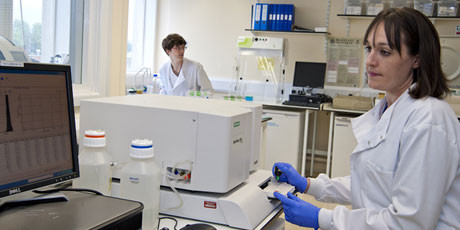Innovative plan for Liverpool’s health economy
An innovative plan has been developed by the Local Enterprise Partnership (LEP), the North West Coast Academic Health Science Network (NWC AHSN) and Liverpool Health Partners (LHP) to enable the Liverpool City Region (LCR) to become the fastest place in the UK to develop and commercialise quality research in precision medicine.
Liverpool Health Partners (LHP) are lead delivery partner for the project and a report entitled Liverpool Precision in Medicine (PRiME) has now been published. LHP executive director, Professor Sir Munir Pirmohamed has described the plan as a “coherent, deliverable action plan until 2020 that identifies LCR’s assets in precision medicine.”
Liverpool City Region is already at the heart of the Government’s Health North initiative, with the aim of unlocking the potential of the north through partnership with life sciences minister George Freeman.
Sir Munir Pirmohamed continued:
“Liverpool City Region itself serves a population of more than half a million and includes some of the highest levels of deprivation and poverty cross the country. Some of our mortality rates are 76% higher than the European average. Liverpool City Region is also commonly referred to as the cancer capital of Europe so we believe this plan will be widely welcomed.”
Also, welcoming the report Robert Hough, chair of Liverpool City Region Local Enterprise Partnership (LEP) said:
“The PRiME report is a further example of how Liverpool City Region is putting science and innovation right at the heart of the Northern Powerhouse and establishing itself as a global leader in the Life Science and Health sector.
“By identifying the city region’s assets in precision medicine, we will be able to build on our strengths in this area, tapping into our regional expertise that will not only bring national and local benefits, but act as a magnet for inward investment. This initiative therefore creates significant follow-through momentum.”
Within the wider north-west region, NWC AHSN has been appointed as the national lead for personalised medicine. Liverpool is already home to excellent genomics facilities that have underpinned significant R&D, providing the city region with a competitive advantage in precision medicine.
Dr Liz Mear, chief executive NWC AHSN, said:
“The AHSN has sponsored this report because our role is drive forward improvements in health care; precision medicine is the key to predicting and preventing disease and targeting treatments so they are bespoke to individual patients. This is an exciting change in how we provide health care and we will be working on ways to speed up the introduction of personalised medicine and bring about real benefits for the population.”
Sir Ian Gilmore, LHP Chairman added:
“PRiME also provides a shared vision, set of priorities and action plan for the purposes of commercialising research in precision medicine, driving associated economic benefits and positive health outcomes. It is, in effect, the precursor for further detailed study and facilitation of work around precision medicine but critically will contribute to the delivery of the LCR innovation plan.”
Jo Pisani, partner with Price Waterhouse Coopers who led the work on PRiME and who runs the company’s UK Pharma & Life Sciences consulting practice said:
“Liverpool PRiME represents the front line of cross-sector collaboration between life sciences, pharma, the NHS, Local Enterprise Partnerships, industry and government. We look forward to continuing to bring our skills, experience and thought leadership to this pioneering agenda, and are proud to have played a role in such an exciting and leading-edge programme.”
The successful bid for the North West Coast NHS Genomic Medicine Centre (NWC GMC), a partnership led by Liverpool Women’s Hospital alongside the North West Coast Academic Health Science Network, Liverpool Health Partners and involving several other NHS Trust from the region, has further strengthened genomics in the region.
Angela Douglas, programme lead for the NWC GMC said:
“We have a vision and an aspiration for Liverpool to be a prime provider of NHS Genomic Services beyond the 100,000 Genome Project; we want to build on the strong foundation of the GMC, create genomic pathways enabling an NHS transformation legacy that will accelerate uptake with advanced genomic medicine practice, integrated into the NHS, delivering better outcomes for our patients.
“The NW Coast GMC, as of 11th September, is one of only two GMCs that have exceeded their trajectory forecast for patient recruitment and has been at the top of this GMC performance leader board, for recruiting patients into the project, since the ‘Go Live’ date in May 2015 . The PriME report will be fundamental to realising those aspirations.”
The plan has already received strong support from amongst others, Sir Alasdair Breckenridge (former Chairman MHRA) stated:
“Precision medicine implies giving the appropriate drug in the appropriate dose at the appropriate time to the appropriate patient. This concept has gained great traction with the emergence of genomic medicine and represents one of the most important advances for the treatment of an increasing number of common diseases. As scientific knowledge increases, so will the scope of precision medicine.
“Liverpool City Region is extremely well placed to make important advances in the field of precision medicine. This has already been recognised by major funders of medical scientific research in the UK-the Wellcome Trust, the MRC and the Department of Health, all of whom have invested heavily in academic medicine in Liverpool City Region. In addition, the NHS in the city region has learned how to work harmoniously with academia in this field, a partnership which is crucial for success. I am extremely pleased to be involved in this important development and I give it my strongest support.”
Four priorities have been identified which will drive the ambitious vision of Liverpool PRiME. Along with a focus on industry engagement and strategic communication, they critically include the Liverpool Biomedical Research Centre and the FUTURE initiative which aims to create a database of 3000 healthy volunteers who will be fully genotyped for drug disposition genes that will provide a unique resource that will facilitate early phase studies for Industry and healthcare.
For more information, visit www.liverpoolhealthpartners.org.uk


